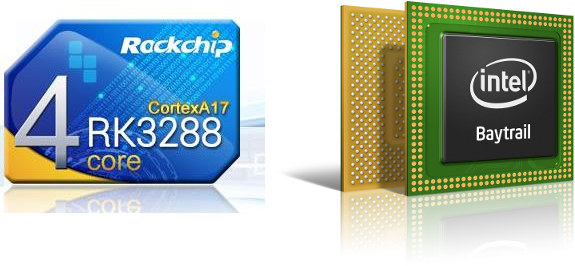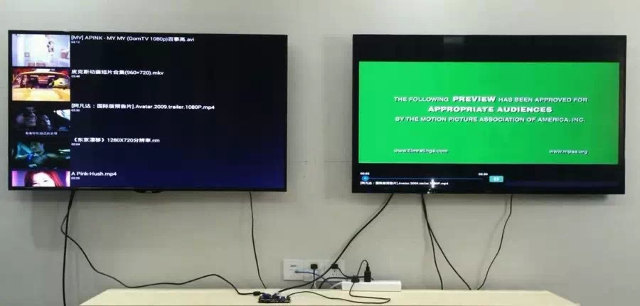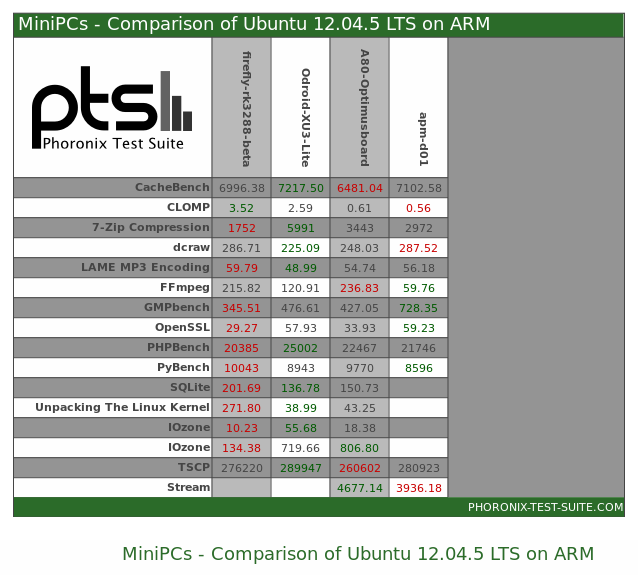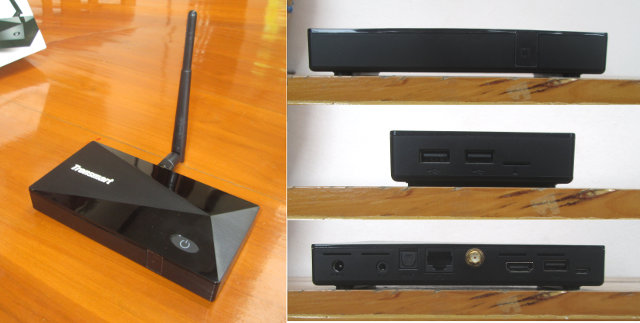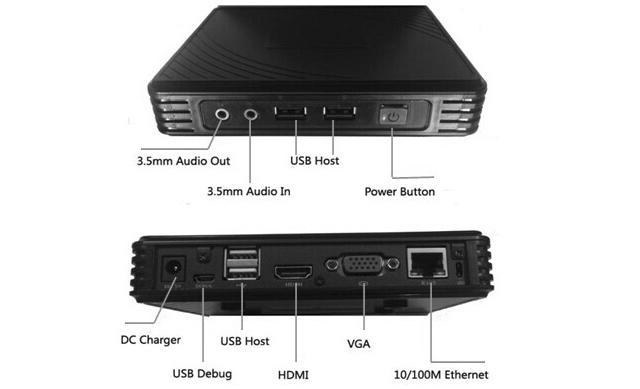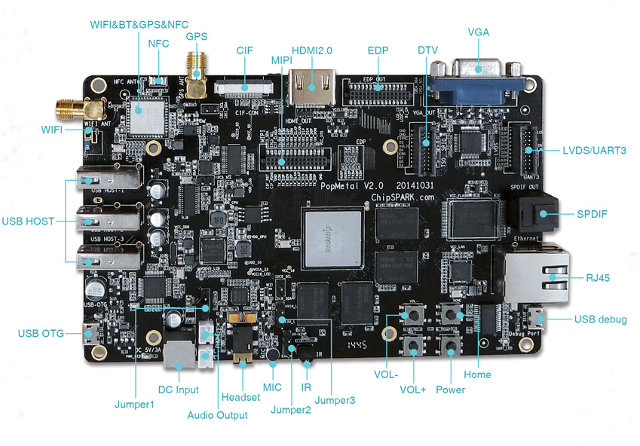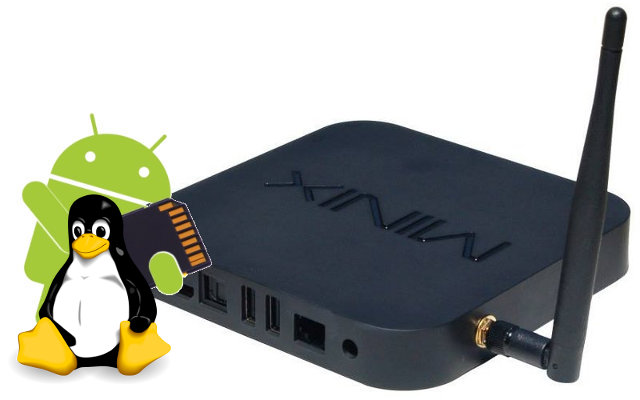Most ARM mini PCs run Android, while mini PCs based on Intel Atom Z3735F currently all ship with Windows 8.1, so it makes comparison difficult. But since Linuxium posted triple boot instructions (Ubuntu, Android, Windows 10) for MeegoPad T01, he’s also run Antutu 5.6 on the platform, so we’ve got a comparison point. The Android image used in the Intel platform is Android-x86, and may not have been optimized for Bay Trail yet, so even though the comparison may not be perfect, it could still be interesting to find out the strengths and weaknesses of the Intel processor, against one of the fastest ARM processor found in mini PCs: Rockchip RK3288. I’ll use the Antutu 5.3 score I got with Open Hour Chameleon as a reference point. Rockchip RK3288 Intel Atom Z3735F Delta CPU Quad core Cortex A17 @ 2.0 GHz Quad core @ 1.33 GHz (Burst 1.83GHz) GPU ARM […]
Independent Dual Display Support on Firefly-RK3288 Development Board (Video)
From time to time, I’m being asked which platform can support dual independent displays, and although I noticed Mele A1000 (Allwinner A10) did support dual displays in Linux, I never really investigated how well it handles it, so I normally recommend to have a look at x86 platforms with AMD or Intel processor that specifically claim support for dual independent display. But today, I’ve noticed a developer working for T-Chip posted a nice demo on T-Firefly forums with two displays connected via HDMI and VGA. The demo shows Firefly-RK3288 development board running Android with two displays in three configurations: Display Mirroring – The same content is shown on both display. Especially useful for digital signage application, where one board can drive two displays with the same content Extended Desktop – The user interface is extended on both monitors. It’s like having a single large monitor with a 32:9 aspect ratio […]
Linux Benchmarks – Rockchip RK3288 vs Exynos 5422 vs AllWinner A80 vs Intel Atom Z3735F
With all these Intel Atom Z3735F been released right now at a price similar to ARM based mini PCs, many people, including myself, are wondering about the performance of the low cost Intel processor against their ARM competitors. Ian Morrison just published some results from Phoronix Test Suite comparing the performance of Firefly-RK3288 (Rockchip RK3288), ODROID-XU3 Lite (Samsung Exynos 5422 BIN2), and A80 OptimusBoard (Allwinner A80) in Linux (Ununtu 12.04.5), against the performance of MeegoPad T01 (Intel Atom Z3735F) running Linux from a Live CD on a USB drive. Some of the benchmarks failed because Phoronix Test Suite got apparently confused with the file systems located on a USB drive, but at least we’ve got a comparison point, and the results are a bit confusing, as they’re no clear winner. In some tests like FFmpeg, the Intel SoC really crushed the ARM competition being at least twice as fast as […]
Top 10 Posts of 2014 and Stats on CNX Software
Wow! After a slow start of the year, 2014 has been a busy year as new devices based on newer processor from Amlogic started to flood the market in Q2, soon followed by even more Rockchip RK3288 based media players, and then some more Amlogic S805 and Allwinner A80 boards and devices. It’s now the last day of the year, so just like in 2013, it’s time to look back on the main trends of the year, and based on the list of the top 10 most visited posts below, the new generation of ARM Android media players were the most important story of the year on CNX Software, but we also saw more IoT devices and board like Vidonn X5 or LinkIT One, lots of new Wi-Fi modules, and by the end of the year ESP8266 seemed to have won that fight, but being found in $3 Wi-Fi modules. […]
Best Android Mini PCs Awards of 2014
I’ve reviewed quite a few Android media players this year, and as 2014 comes to an end, I thought it might be worth writing a best of 2014. But it’s difficult to announce an overall winner since all have some flaws one way or another, I’ll classified by categories: Best Ethernet, Best Internal Storage, … a bit like for “Oscars ceremony awards, based mostly on objective results from my tests. However, and somewhat oddly for a media player, I won’t select any TV boxes based on their video playback capabilities, as so far I haven’t found one that can play most 4K / H.265 videos reasonably well in Kodi, and video playback tests are also subjective. This is obviously a flawed contest as they all are, because in order to be nominated, the media player must have been reviewed on CNX Software. But it should be fun anyway, so let’s […]
Giayee Atom PC is a Rockchip RK3288 Mini PC with a VGA Port, Multiple Placement Options (Crowdfunding)
You may know that Rockchip and Intel have a partnership to design Atom Sofia processors, but Giayee Atom PC has nothing to do with this initiative at all, and it’s just a pretty standard Rocchip RK3288 based mini PC, except it includes a VGA port, and various “placement” options namely horizontal position, vertical position, and TV/monitor mount. Atom PC specifications: SoC – Rockchip RK3288 Quad Core Cortex A17 up to 1.8GHz with ARM Mali-T764 GPU supporting OpenGL ES1.1/2.0/3.0, Open VG1.1, OpenCL, DirectX11 System Memory – 2GB DDR3 Storage – 8 GB NAND flash (16 to 32 GB optional) Video Output- HDMI up to 1080p (no 4K?), and VGA up to 1920×1080 @ 60 Hz Audio Output / Input – HDMI, 3.5 mm jacks for Audio In and Out Connectivity – 10/100M Ethernet, 802.11 b/g/n Wi-Fi. Options: Dual band Wi-Fi, GPS, NFC, and Bluetooth USB – 4x USB Host ports, 1x […]
PopMetal Rockchip RK3288 Development Board Features Multiple Display Interfaces (HDMI, VGA ,eDP, LVDS, MIPI), GPS and NFC Connectivity
Up to now, we’ve had mainly two development boards based on Rockchip RK3288 Cortex A17 processor: Firefly-RK3288 is a low cost development board powered by Rockchip RK3288 processor selling for as low as $140 shipped, and Radxa Rock 2, a more professional and expansive solution with dual Ethernet, 3G modem and so on. A third RK3288 board has now surfaced which offers a middle ground between Firefly and Radxa boards. PopMetal development board comes with 2GB RAM, 8GB eMMC, 5 video outputs / display interfaces namely HDMI, VGA, embedded DisplayPort (eDP), LVDS, and MIPI DSI, as well as the usual Gigabit Ethernet, Wi-Fi, and Bluetooth connectivity, complemented with GPS and NFC. PopMetal technical specifications: SoC – Rockchip RK3288 quad core ARM Cortex-A17 processor @ 1.8Ghz with ARM Mali-T764 GPU with support for OpenGL ES1.1/2.0/3.0, OpenVG 1.1, OpenCL 1.1, DirectX 11 System memory – 2GB DDR3 Storage – 8 GB eMMC, […]
Boot Ubuntu (Linux) or Android from an SD Card on Rockchip RK3288 Devices
There’s already a method to boot Android from an SD Card on RK3188 devices, which should work with all Rockchip RK3188 devices. Ian Morrison (Linuxium) has now provided a instructions to boot Linux or Android from a (micro) SD Card in Rockchip RK3288 based devices, leveraging work from linux-rockchip community, and especially naobsd. The Android flashing method is slightly different between RK3188 and RK3288, because most Rockchip RK3288 devices make use of eMMC flash, while older Rockchip RK3188 products feature NAND flash, and it appears Rockchip RK3xxx boot priorities (in the BootROM stored in the SoC itself) are as follows: eMMC, SD card, and NAND flash. All that means is that an updated version of the bootloader is needed which looks for a bootable SD card, and although very unlikely, your device could end up being bricked during this procedure. This is not a problem for Open Hour Chameleon since […]


